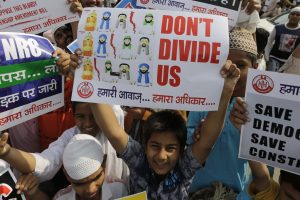India dropped 10 places in the Economist Intelligence Unit’s recently released democracy index, marking India’s worst performance since 2006 when the rankings began. The drop in rankings is largely due to the erosion of civil liberties. That begs the question: is India moving toward an elected autocracy?
Political scientists Steven Levitsky and Daniel Ziblatt, in their book How Democracies Die, argue that unlike typical fascist, communist, or military dictators, elected autocrats do not subvert democracy in one fell swoop. There is no formal declaration of emergency or violent capture of power. Free and fair elections are held regularly, giving the semblance of a vibrant democracy. Instead, democracy is subverted through small incremental steps, which, in isolation, do not seem to be problematic and are in fact legal. But when viewed cumulatively over a period of time, these moves reveal a pattern aimed at loosening the nuts and bolts that hold a liberal democracy together.
Levitsky and Ziblatt point out the following traits of elected autocrats. First, elected autocrats try to capture the referees — i.e. independent institutions such as the judiciary, election commission, law enforcement agencies, and the media — by packing them with government loyalists. These institutions act as a check on the political executive — the most powerful branch of a democracy — so that the game of democracy can be played freely and competitively, without cheating. Packing these institutions with government loyalists helps shield the political executive from being held accountable and adds to the executive’s coercive firepower to take dissenters or opponents to task.
Second, elected autocrats try to appropriate important figures in society such as intellectuals, cultural icons, cinema and sports stars, and business leaders to propagate government narratives. Those who refuse to be co-opted or who question the government are sidelined, silenced, or even maligned.
Third, elected autocrats disregard mutual tolerance. For a liberal democracy to thrive, political parties need to accept each other as patriots and as legitimate rivals and adversaries. But elected autocrats paint opposition parties as the nation’s enemy. In fact, identifying enemies, real or imagined, external or internal, is critical for elected autocrats to rally people to their side. A populist narrative that the country is under threat and only a strong leader can deliver prosperity and security produces a “rally round the flag effect.” People become less critical of the government’s failures and are willing to accept authoritarian streaks because of the belief that their very existence, as well as the nation’s, is at stake.
Fourth, elected autocrats don’t care much for institutional forbearance, i.e. exercising restraint and not doing something lawful if the action would vitiate the spirit of the law. Elected autocrats use democracy to undermine democracy.
There are several instances of these things happening in India. The world’s largest democracy ironically has emerged as the internet shutdown capital of the world. In addition to a six-month internet blackout, three former chief ministers and other leaders of Jammu and Kashmir have been in detention for months since the dilution of Article 370 of the Indian Constitution – a provision that guaranteed autonomy to the state of Jammu and Kashmir.
Several sections of the Indian society have been protesting against the newly enacted Citizenship Amendment Act (CAA), a law that promises to fast-track a path to citizenship for religiously persecuted non-Muslim refugees from Pakistan, Bangladesh, and Afghanistan. Instead of engaging with the protesters, the establishment has displayed bitter combativeness and sheer hubris. The anti-CAA protests have been used to push the “us versus them” polarizing narrative.
The neutrality of India’s referees such as the election commission, investigative agencies, and the police has been questioned. The Indian Supreme Court appears to be pussyfooting around instead of holding the central government accountable and upholding the constitutional order. Sections of the media appear to be indirectly controlled by the political executive and are seen parroting the government narrative. Spiritual gurus are invoked to muster support for the government’s initiatives. Popular cinema is used to propagate the government’s narrative on hyper-nationalism; artists who take a different line are slandered. A union minister publicly rebuking a leading Indian actress for her stand is a case in point.
Pejorative sobriquets like anti-nationals, urban naxals, jihadists etc are thrown at dissenting voices so as to delegitimize and demonize them, and to normalize a name-calling culture. All opposition political parties and their leaders are projected not just as corrupt and crooked but also as India’s enemies who have no moral legitimacy to govern. Like populists all over the world, the leaders of the ruling party claim that they have the sole moral legitimacy to represent the will of “the real people.” Contentious constitutional amendments and other legislation — such as the dilution of Article 370, amending the Right to Information act, criminalizing triple talaq, and now the CAA — have been rammed through using a brute parliamentary majority, vitiating the spirit of democratic deliberation.
Indira Gandhi’s draconian emergency rule in the mid-1970s was India’s first brush with elected autocracy. She ruthlessly undermined civil liberties in a “legal” manner. We see these elements resurfacing today, laced with frenzied ethno-cultural nationalism. India pushed back against Indira’s elected autocracy. Will it do it again? We shall see!
Prabhash Ranjan is a senior assistant professor at South Asian University’s faculty of legal studies. The views expressed here are personal.

































